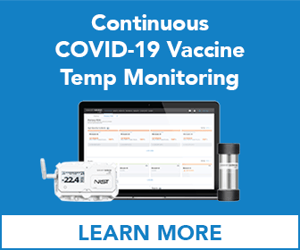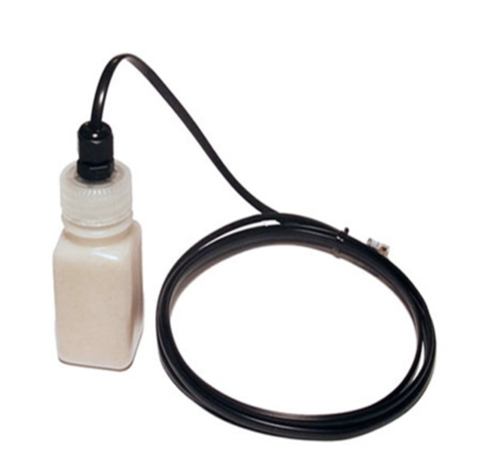Written by SmartSense
Key takeaways
 With flu season fast-approaching, your pharmacies will be receiving a large influx of vaccines. As they are inherently unstable, flu vaccines require temperature control during storage and transit along the cold chain. Sub-optimal temperatures can result in wasted product, or worse, costly re-vaccination programs.
With flu season fast-approaching, your pharmacies will be receiving a large influx of vaccines. As they are inherently unstable, flu vaccines require temperature control during storage and transit along the cold chain. Sub-optimal temperatures can result in wasted product, or worse, costly re-vaccination programs.
To ensure a smooth flu season, here are six ways to protect your vaccine inventory across all your locations.
1. Store Vaccines in the Correct Fridges & Freezers
Using the correct refrigerators and freezers is extremely important to minimize the chance of accidental freezing, thawing, or warming. Pharmacies are strongly recommended to use stand-alone, purpose-built units specifically engineered to maintain temperatures evenly throughout the interior, rather than combination units such as bar style fridges.
Across all of your locations, pharmacy staff should be trained to properly maintain refrigeration units. Pay careful attention to the following three considerations:
- Space: Ensure that your unit is the right size to handle the quantity of vaccines you’ll be handling during flu season. It should contain enough room to store the complete inventory without crowding.
- Placement: Vaccines should be placed in the central refrigerator space, in their original packaging, inside designated storage trays positioned 2 to 3 inches from refrigerator walls.
- Continuous Monitoring: Use a remote monitoring device to guarantee temperature accuracy for each storage unit. Temperature excursions may otherwise go unnoticed, potentially leading to reduced potency.
2. NIST Recommendation for Buffer Vials

During continuous monitoring, you want to be confident that what is being recorded is the actual temperature of the vaccine rather than the air temperature of the unit’s interior. The National Institute of Standards and Technology (NIST) has demonstrated that buffer vials measure the temperature of vaccine vials most accurately. As a result, CDC recommends the use of digital, data-logging thermometers with glycol-encased probes to prevent false alerts.
However, buffer vials can take up valuable space, especially during flu season. One solution to help save space is a Virtual Buffer Vial, which uses thermodynamic principles to model how a vial of glycol will respond to the temperature of its environment.
3. Monitor the Temperature During Transport
Best practices recommend that vaccines intended for use at an off-site or satellite facility should be delivered directly to that facility using a portable vaccine refrigerator with a buffer vial placed as close as possible to the vaccines. Transport only what is needed for the day, and record temperatures at least every hour.
4. Monitor the Temperature at Off-site Flu ClinicsFor your pharmacists who are facilitating flu clinics, ensure that they are educated with the proper protocol. Upon arrival at a flu clinic, vaccines must be stored as soon as possible in an appropriate refrigerated unit. Use a digital temperature monitoring device to record temperatures continuously throughout the off-site to ensure vaccine efficacy. Lost time and readings outside a 2 °C to 8 °C range can compromise effectiveness and potency. A meta-analysis published in Vaccine estimated up to 35% of delivered vaccines are subjected to inappropriate storage temperatures.
5. Keep Detailed Temperature Records
Temperature data should be downloaded at least once per week, always at the same time. It should also be downloaded any time that the high or low temperature alarm is activated. As per the CDC, historical logs should be kept for three years at a minimum. Each location should maintain data backup on an external hard-drive or print and file hard copy records. Utilizing a continuous monitoring solution, such as SmartSense, allows you to have 24/7 access to a 10-year historical data log.
6. Learn from Recent Recalls and Stay Up-to-date with CDC Guidelines
Regularly research the status of all vaccine recalls on the FDA website. Recalls of vaccines may be conducted on a firm's own initiative, by FDA request, or by FDA order.
Progressive and responsive adherence to all CDC requirements is essential for vaccine storage. As recommendations change, pharmacists must remain current to prevent vaccine degradation. As always, please refer to the CDC website for full and official documentation of these sensitive practices as well as updates as they occur.
Subscribe to our Blog!
Subscribe to our blog to get weekly email updates about quality and safety issues important to the pharmaceutical industry.
Topics:
Subscribe to the SmartSense Blog
Stay up-to-date on the evolution of IoT connectivity.